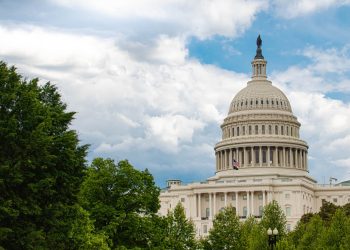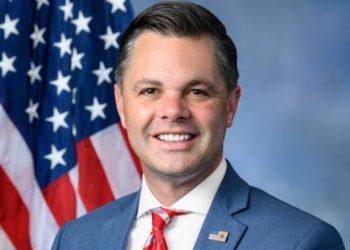DES MOINES, Iowa – U.S. Rep. Ashley Hinson, R-Iowa, discussed with members of the Iowa press on Thursday the Protecting Financial Privacy Act, a bill she introduced this week to block the Internal Revenue Service (IRS) from monitoring bank accounts of $600 or more.
A Biden Administration proposal published in a U.S. Treasury Department document in May would require banks annually to turn over to the Internal Revenue Service data for all business and personal accounts from financial institutions, including bank, loan, and investment accounts holding more than $600. Banks, under the proposal, would report on “gross inflows and outflows” with a “breakdown for physical cash, transactions with a foreign account, and transfers to and from another account with the same owner.”
The document also said that banks would report “not only gross receipts but also gross purchases, physical cash, as well as payments to and from foreign accounts, and transfer inflows and outflows.”
“Requiring comprehensive information reporting on the inflows and outflows of financial accounts will increase the visibility of gross receipts and deductible expenses to the IRS. Increased visibility of business income will enhance the effectiveness of IRS enforcement measures and encourage voluntary compliance,” the document said, explaining the rationale for the proposal.
Hinson says House Democrats want to include that proposal in the reconciliation bill.
She said she saw several problems with the proposal.
“Number one, it would bog down our community financial institutions with paperwork, likely forcing many of them possibly to shut down or have to, you know, put put resources elsewhere when they need to be serving our people and getting them the capital they need. It reduces access to credit and capital for Iowa families and businesses when that happens, especially in our rural areas,” Hinson said.
“Also plain and simple, it’s an unprecedented invasion of privacy. It would give the IRS the ability to monitor Americans’ financial transactions and bank accounts at a granular level. The IRS does not need to spy on the bank accounts of Iowa families, farmers, and small businesses. They don’t need to be monitoring these basic personal transactions,” she stated.
“Iowans do not want the IRS monitoring when they’re paying their rent or utilities. Or if they just made a big grocery store run,” she added, saying the IRS does not need “granular information” from Iowans’ bank accounts.
The Iowa Torch asked Hinson about the arbitrary $600 amount designated in the proposal, why she thought it was so low.
“They want to see something every day so they can get in our bank accounts and force tax compliance in ways that they’ve never done before. I think that is what it does in essence,” she answered.
Hinson said she has talked with bankers who have had customers express concern about the proposal and suggest they may pull their resources out of the bank because they don’t want the IRS spying on them.
“So I think this is a bigger risk, long term. I think they are going to come for our tax dollars, and they’re going to do it however they can. And they want to, essentially, I think it’s quadruple the budget for the IRS right now to $80 billion. And this is a time when we need to be focused on adding more border agents, not more IRS agents,” she told The Iowa Torch.















